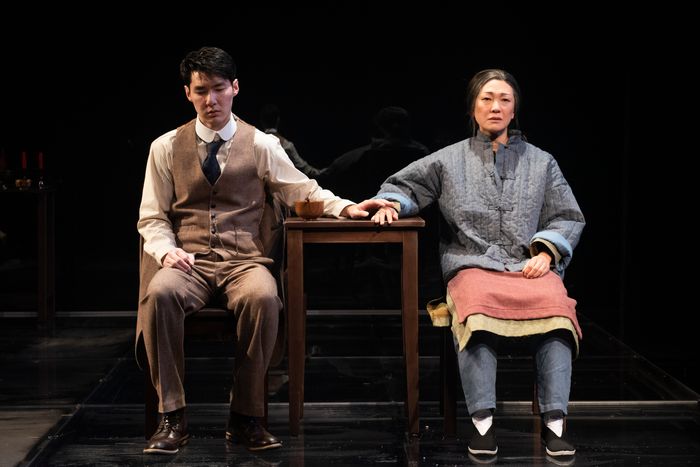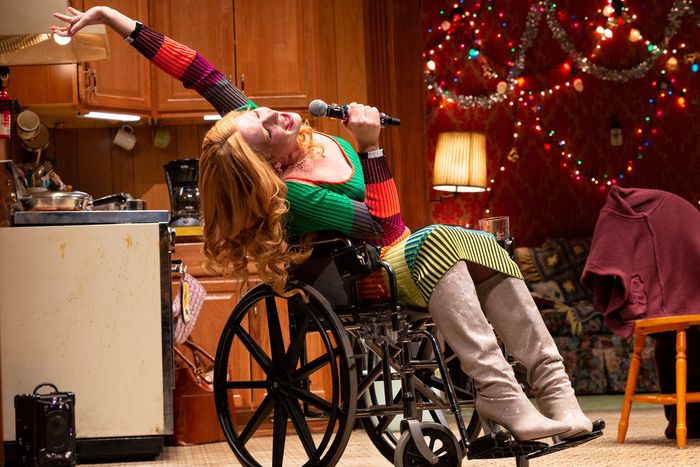
What’s in a name? In Lloyd Suh’s The Far Country, he’ll calculate the exact value for you in dollars and cents. The play begins in California in 1909, after the ratification of the Chinese Exclusion Act of 1882 and then the destruction, in the 1906 earthquake, of numerous government records. Gee (Jinn S. Kim) is applying for citizenship because, as Suh unspools in an extended interrogation scene, he has seen an opportunity to claim he was born in America. That citizenship gives him a name that he can sell, and he returns to Taishan looking for a young man to bring back to California to aid him in his laundry business in the guise of his son.
The Far Country has an epic sweep, but the play breaks down into a series of long negotiations. Once Gee is in Taishan, he meets with — or rather, targets — a down-on-her-luck farmer, Low (Amy Kim Waschke), promising that he can offer her son, Moon Gyet (Eric Yang), a new life if he takes on a new name. Gee calculates out the literal cost for her: an upfront fee for passage to America, requiring going into debt to a moneylender, plus garnished wages once he’s in San Francisco. Eventually he’ll earn far more than he could as a farmer, but not without years of indentured work. Low, meanwhile, also ponders the metaphorical cost of severing the own connection between her son and their family history.
Moon Gyet, listening in on their conversation, seizes upon Gee’s offer. But in the next scene, he’s stuck on Angel Island, held in limbo among hundreds of other Chinese men and grilled by American officials trying to root out whether his story is true. They ask him, repeatedly, about miniscule details of his falsified childhood, returning to questions about the number of steps to his home and school and even the shade of gray of those steps. This negotiation, as Suh depicts it, is a performance, one that requires abandoning your old self at the door. In confinement, waiting for his next round of interviews, Moon Gyet finds bits of poetry etched into the walls of his room. The writing glows from the walls of Clint Ramos’s set, which also surrounds the stage with water. It’s ghostly, as if the selves the men gave up to try to make it across the ocean are haunting them.
Suh, who also dug into occluded history in The Chinese Lady, uses the long scenes of The Far Country to stretch apart the facts and figures of the past and examine the filaments in between. He trusts the audience to fill in the jumps in time and allows the actors and director Eric Ting the space to explore their characters’ contradictory impulses. Gee, as Kim plays him, puts on the persona of a genial fool for the Americans and then becomes a smooth operator when talking to Low, who both resists the idea of the Americanization of her son and folds when she knows she’s getting an offer she can’t refuse. Yang, as Moon Gyet, does well with the tough task of carrying much of the plot, and Shannon Tyo (also of The Chinese Lady) runs away with the second half as Yuen, a practical young woman in Taishan who, in turn, gets a similar offer of her own. At times, as in the depiction of Angel Island, the urge to describe all the details gets away from Suh, and you can feel his need to lecture overwhelm the drama, but the play for the most part is calibrated more at the human scale. In buying and selling their names, these characters are really buying and selling their pasts and their futures. The existential aspect of that gamble exists right alongside the mundane talk of finding a price and shaking on it.
Where The Far Country spends its time filling in the elisions and empty spaces of history, Denis Johnson’s Des Moines takes gaps and voids as its subject. The disjunction seems to be the point. It has a fairly classic premise for a drama: A group of odd characters, loosely connected, ends up spending a night together getting drunk and revealing their truths. Yet it resists — sometimes intriguingly, sometimes maddeningly — the conventional rhythms of a staged conversation. The play begins with Marta (Johanna Day) and Dan (Arliss Howard) making conversation over dinner. He’s a taxi driver, explaining that a woman widowed by a plane crash has sought him out because he drove her husband to the airport that day. That thread gets interrupted by discussions of spaghetti and margarine (he hates it) and spotting their priest wearing makeup outside a gay bar late at night, and also that her doctors have told her she might die within months. Soon enough, Father Michael (Michael Shannon, delivering lines as off-kilter as possible) has shown up, and so has the widow, Mrs. Drinkwater (Heather Alicia Simms), and so has Marta and Dan’s daughter, Jimmy (Hari Nef), who uses a wheelchair owing to a gender-reassignment surgery gone wrong and wields a karaoke mic. As the characters all get wasted, their shared sadness blurs together, and we witness a sort of catharsis, though the terms are unclear.
In a note in the Playbill, Theater for a New Audience artistic director Jeffrey Horowitz says that he, director Arin Arbus, and dramaturg Jonathan Kalb last workshopped Des Moines in 2015, and suggested to Johnson then that the script needed clarifying. He refused to change it and died a few years later. This staging sticks with that unclarified script, seeming to incorporate Johnson’s death into its many vagaries. A revised version of Des Moines might better explain the bond that Jimmy and Father Michael share, or what Johnson’s intended with his depiction of Jimmy, repeatedly misgendered by her parents when not mistaken for their deceased daughter. But there’s also something fascinating about the many absences in the script, where you might intuit something but know you’re only guessing. A better play would be more direct, but it would also be less potent. The emptiness of Des Moines feels as vast and unsettling as its Great Plains setting. Facing up against the cutoff of death, all there is to do is drink and sing and avoid talking about it.
The Far Country is at the Atlantic Theater through January 1.
Des Moines is at Theater for a New Audience through January 8.



